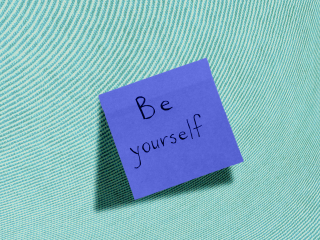If you’ve ever applied for a job or downloaded Hinge, you’ve probably heard people say something like, “I’m looking for someone with good communication skills.” That quality is rightfully put on a pedestal—after all, nobody wants to deal with passive-aggressive coworkers or be the couple fighting in The Cheesecake Factory.
But what even counts as effective communication? Is it just saying whatever’s on your mind? Asking, “Are you mad at me?” to anyone who’s remotely distant? Firing off texts as fast as the youths? Not quite.
Here’s the basic premise: Healthy communication looks like being honest about your feelings and sharing them at the right time and place. “It’s a skill just like anything else we learn,” says licensed psychologist Joy Harden Bradford, PhD, host of the Therapy for Black Girls podcast and author of Sisterhood Heals.
Effective communication also means listening to understand—not just to react. When you approach your interactions with effective communication skills, you’re better equipped to navigate relationship hurdles, reduce anxiety, and build trust with others, Dr. Harden Bradford explains.
So if you or someone who shall not be named has been sweeping issues under the rug, glossing over emotions, or feeling disconnected, try these therapist-backed ways to communicate like a pro. They’ll help you build stronger relationships with anyone (even your office nemesis).
1. Don’t read minds or assume people can read yours.
As nice as it would be for others to (occasionally) supernaturally know what you’re thinking and predict your needs, most people don’t have that talent. When you assume people know how you’re feeling or vice versa, it can lead to disagreements, unmet needs, and resentment, Dr. Harden Bradford explains.
To avoid those scenarios, check in with yourself before interacting with others. If delivering deliverables at work has you feeling off, don’t assume the next person you speak to already knows you’re stressing.
When you’re engaging with someone who seems a bit off, asking questions is a good way to show you’re invested and want to get to the bottom of any issue, Dr. Harden Bradford says. You could try something like, “I’m not sure what happened, but I think our dynamic is off. Does that match how you’re feeling?” Or a simple, “You don’t seem like your usual self today. Is everything OK?” can work. When you address the elephant in the room and give people space to respond truthfully, it’s easier to communicate from there.
2. Tune in to your nonverbal cues.
Our body language often signals more than we realize, Dr. Harden Bradford says. Sometimes that sends a mixed message to whomever we’re spending time with. For example, if you’re on a date or even at a networking event, yawning, checking the time, and crossing your arms can make you seem closed off—even if you just don’t know what to do with your hands.
While you don’t need to be self-conscious of every move you make, some awareness of your body and facial expressions can go a long way. When you’re trying to convey interest or indicate that you’re listening, sit slightly leaned in, face whoever is talking, and throw in a nod to show the person you’re paying attention, says therapist Ahvegyil Skolnick, LCSW. (This goes for both in-person and virtual interactions.)
3. Make some space for unfamiliar communication styles.
When you meet someone new, keep in mind that there are different communication norms across cultures, Dr. Harden Bradford says. For some groups, interrupting conversations is a no-no. In others, butting in to ask questions shows you’re invested in someone’s story.
There can also be differences in peoples’ abilities to read non-verbal communication or express themselves with body language, Dr. Harden Bradford explains. For example, some people struggle to make eye contact, but that doesn’t mean they’re purposefully being rude.
So, when you connect with new people, try to keep an open mind about how they physically or verbally respond, Dr. Harden Bradford says. In a perfect world, everyone would follow these tips and be super clear about what they mean, but that’s not how it works. If you’re confused about their actions or what they’re trying to express, ask questions, she adds.
4. Listen, then reflect.
Raise your hand if you’ve ever gone into a conversation ready to give a 10-point breakdown of why you’re right and they’re an idiot. As sweet as victory may feel, that defensive communication style isn’t helping anyone—not even you.
When you prioritize impulsive reactions over thoughtful reflection and responses, you’re not trying to understand why someone did what they did or why they feel a certain way, Dr. Harden Bradford says. Ultimately, you could end up in a similar disagreement down the road because you didn’t learn from the previous encounter, says Skolnick.
Plus, the other person could feel so shut down by your monologue and rapid-fire rebuttals that they don’t even want to open up to you anymore.
To avoid the tit-for-tat and show you understand, slow things down by explaining that you really want to make sure you’re both being heard and understood, says Skolnick. Then, start modeling how to do that by allowing them to talk first while you listen.
After they’re done talking, rephrase what they said so they (and you) know you got the gist, and then use that knowledge to inform your response, Dr. Harden Bradford says. That’s ~active listening.~
If they struggle and interrupt you, just give gentle reminders that you’re hoping they will show the same respect you showed them, says Skolnick. Feeling heard, especially when triggered, helps diffuse tension.
5. Pause and set a date to circle back.
Most conversations, especially heated ones, are not one-shot deals, so you don’t have to air everything out at once. “A lot of times we find ourselves in these emotionally driven conversations, and we don't say the thing we wanted to say,” Dr. Harden Bradford explains.
So if things are getting out of control or you feel like you’re hitting a wall, ask if you can put a pin in it for now. “There's nothing wrong with going back to that person when you're calmer and saying, ‘Hey, I just want to follow up on our previous conversation,’” Dr. Harden Bradford adds.
6. Consider your timing.
Saving difficult chats (like confronting a friend who didn’t pay you back for the Airbnb) for the right time and place can do wonders for whatever relationship you’re trying to salvage, Dr. Harden Bradford says.
If you or the other person are already tired, cranky, or going through some other shit, forcing a tough conversation could lead to a big blowup and/or one of you feeling piled on, Skolnick adds. “Table heavier topics for when you both have energy and time to process and reflect meaningfully,” she continues.
When someone comes at you at the worst possible time, ask to postpone the convo by saying you’re not in the right headspace and this probably won’t be healthy or effective, says psychiatrist and researcher Ryan Sultan, MD. Then, if you have the bandwidth, you can collect your thoughts and brainstorm any solutions ahead of your chat, Dr. Sultan says.
7. Think about who’s around.
You’ll also want to keep tough talks private, which means no squabbling in front of your kiddos, another coworker, or some mutual friends, says Skolnick. When you’re mindful about where you approach someone, you can avoid outside influences and any extreme reactions inspired by that audience.
Just imagine how embarrassed your partner (who you love) would be if you said they don’t help with childcare in front of your opinionated in-laws. Or how defensive your quiet-quitting coworker would be if you called them out in front of the intern.
8. Use your words when you can.
As evidenced by mindlessly overused ellipses that make texts from your parents feel like hostile, personal attacks, texting doesn’t always get the point across.
Even if you and the other person always have the perfect emoji to sum up your feelings, sending a message doesn’t convey a tone of voice or body language. So, you miss a lot of context. That void often leaves room for easily avoidable misunderstandings and confusion in even the most mundane interaction, Dr. Sultan says.
If a text or email convo makes you feel triggered or confused, Dr. Sultan recommends asking to have the conversation IRL or over the phone so you can grasp what’s being said and how. To take a time-out, Dr. Sultan suggests asking, “Is it possible to talk on the phone about this? I don’t fully understand everything you’re trying to say. Does that work for you? Here’s when I'm free.”
9. Be direct.
Sometimes it’s easier and less anxiety-inducing to drop little hints about your feelings instead of diving into what’s really going on, Dr. Harden Bradford says. Maybe you’re guilty of sighing, “I guess I’ll take out the trash….again” to your roommate. Or, you know, testing your partner with the orange peel theory instead of saying you aren't getting your needs met. But if you don’t address the person who made you feel some type of way, whoever it is, you risk being passive-aggressive (never good)—and they might not even catch on.
This tip is easier said than done, but being direct and speaking up, “goes further in preserving our relationships than beating around the bush,” Dr. Harden Bradford says.
You can start by acknowledging how awkward this is and using “I feel” statements to avoid sounding too accusatory, Skolnick suggests. Try: “Hey, this is really uncomfortable for me to say, but I think it’s important to discuss the housework. I feel like I shoulder a lot of the chores and could use more help. Can we talk about how we split the tasks?”
It’s possible the other person gets upset, sad, or embarrassed, but remind them that you are being straightforward because you want to work on a solution—not call them out.
10. Thank people for having deep convos.
Whether it’s a confrontation or not, getting vulnerable by sharing what’s on your mind isn’t easy. And when the person you’re talking to is willing to push through the awkwardness and support you, that’s a big deal and should be acknowledged.
To express your gratitude, thank whoever was there for you by explaining how much you appreciate them and that you’d like to keep an open line of communication, Dr. Harden Bradford says. You could say something like, “I want to thank you for talking with me about ____. It wasn’t easy to share, but I’m grateful you were there to listen. I hope I can be there for you in the future too.”
If someone confided in you, thanking them for being upfront shows what kind of interactions you value and encourages them to continue being honest with you. All major wins!
The bottom line: Good communication may not come naturally to everyone. But with time and practice, it could become one of your greatest skills, and you can even show others how to be better communicators too.
Wondermind does not provide medical advice, diagnosis, or treatment. Any information published on this website or by this brand is not intended as a replacement for medical advice. Always consult a qualified health or mental health professional with any questions or concerns about your mental health.





